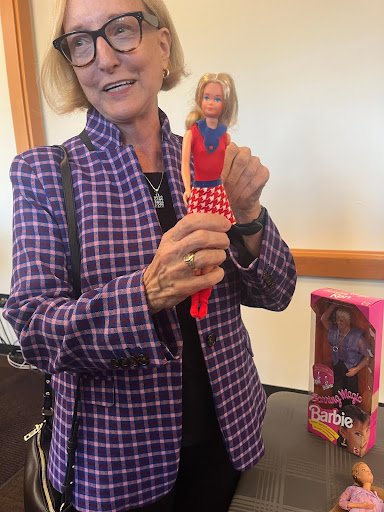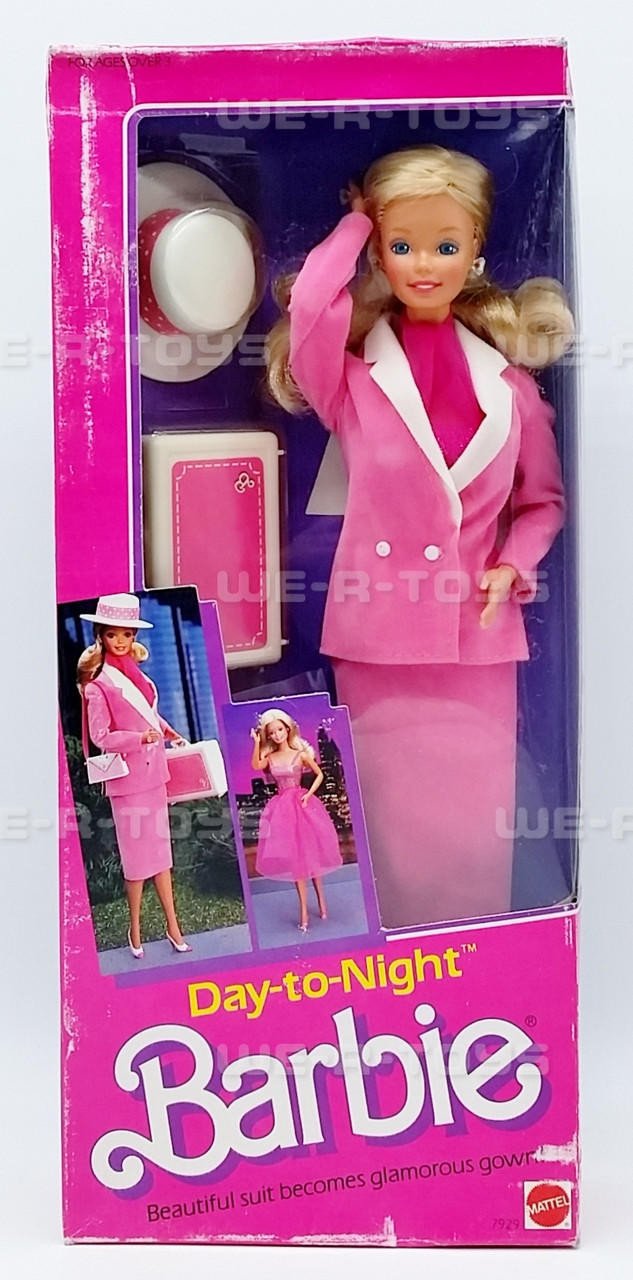By Emily McCready
Barbie is not just a toy but an idea that evolved from the female experience and has changed over time in relationship to feminist theory and practice, author and journalist M.G. Lord recently told a UC Santa Barbara audience.
Author and journalist M.G. Lord holding one of her favorite Barbies “Growing Up Skipper.”
Lord is an English professor at the University of Southern California, a first-generation Barbie owner and author of Forever Barbie: The Unauthorized Biography of a Real Doll. She co-hosts the popular podcast L.A Made: The Barbie Tapes, which explores the story of the doll’s creation.
“Barbie is more than her physical self, she is more than an extension of her creator,” Lord said. “She is an idea. An idea that has changed in relationship to feminism.”
Lord, who has dedicated much of her life to exploring the passion and controversy that Barbie dolls inspire, was hosted by UCSB’s Interdisciplinary Humanities Center. Her talk, “Is Barbie a Feminist? It’s Complicated,” was part of the IHC’s Imagining California Series.
“Pregnant Midge” Barbie doll.
Barbie was invented in 1959 by Ruth Handler at the brink of second wave feminism. The creation and success of Barbie and Barbie dolls sparked controversy among feminists due to the unrealistic shape of her body, which represented an impossible stereotypes for women.
Lord showed the audience discontinued Barbie dolls from her childhood that she had brought from home as well as ‘Growing Up Skipper’ and ‘Pregnant Midge.’ Skipper was created in 1964 as Barbie’s little sister —with a strange twist. Lord winded Skipper’s arm backwards to demonstrate that the doll sprouted breasts, and grew a quarter of an inch, displaying a fixed portrayal of puberty. The Growing Up Skipper doll failed to achieve popularity among the public, leading to its discontinuation in 1977.
Midge, who Lord referred to as “Barbie’s ugly sidekick,” was created in 1963, eliminated in 1968, and reintroduced in 2002 as the first pregnant Barbie Doll. Lord pointed out the permanently molded wedding ring on Midge’s left hand and detachable baby bump with a baby inside, pointing to the link between female reproduction and marriage.
“Day-to-Night” Barbie doll.
Even so, when pregnant Midge hit the shelves, despite the ring on her finger, there was controversy, as her husband Allen was sold separately. “Conservative protesters demonstrated and wrote letters to Walmart suggesting that poor Midge not only encouraged teen pregnancy, but worse, single motherhood,” Lord said.
Lord noted the controversies over gender stereotypes encouraged by Barbie dolls, but also acknowledged the impact of Barbie’s early feminist portrayals. The 1962 Barbie had notable pro-feminist traits, namely a historically significant narrative as a self-supporting woman without a husband. The military draft during the Vietnam War and the enlistment of millions of men left women of the time to take over professional roles previously held by men. Women became sole household earners, in addition to their usual roles of mother and homemaker. Barbie portrayed empowered women, versatile in their abilities, and liberated from the support of a man.
With the emergence of the third wave of feminism, Barbie went on to reflect the rise of women in the workforce following the recession of the early 1980s, and she expanded the definition of female identity once again.
Lord recalled one particular Barbie in a pink business suit that could transform into a party outfit with the removal of the jacket and twist of the blouse. These ‘Day-to-Night’ Barbies were a part of the ‘We Girls Can Do Anything’ Barbie ad campaign of 1985, demonstrating that the work-hard-and-play-hard adage applied not only to men.
Barbie has made a comeback yet again, with the release of this past summer’s hit movie directed by Greta Gerwig. “One thing that Gerwig really got right is that Barbie has never been a doll invented by men to oppress women,” Lord remarked. “Rather, invented by women for women to teach women, for better or worse, what’s expected of them,” she said. “And the expectations have always been too high.”
Video of the UCSB Interdisciplinary Humanities Center event: Is Barbie Feminist? It’s Complicated. USC professor M.G. Lord spoke as part of the Imagining California series.
Emily McCready is a fourth-year UCSB student, majoring in Sociology. She covered this event for her Writing Program course Digital Journalism.




